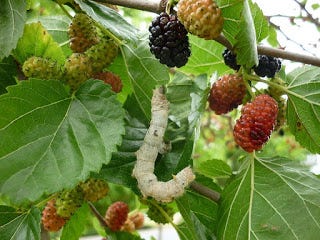After posting the
video commentary to Hexagram #12, where I had recited the text of the hexagram as it appears in
The Magician's I Ching, someone presented me with an interesting question:
"
What happened to the roots of the mulberry tree in line 5? Anyway, I am surprised that your version is so much different from the original text, that's all."
I felt that it was important to present an answer to this, for those who are students of
the Yi Fa Society or readers of my book.
For a start, line five, in the original text, doesn't refer to any 'roots'. It refers to the flower-buds of the Mulberry tree. This is a reference to fortune, patience, and constancy.
So for those who know what the reference to the mulberry tree means, the meaning is in the line I quoted. For those who don't know what the reference to the mulberry tree means, the meaning is in the line I quoted.
"Bao" refers to the calyx or bud of a flower. Xi in this case (to tie) refers to a silkworm, which will make its cocoon next to the flower bud of a mulberry tree.
In other words, it is a stuckness that must be done, to follow one's true will. When the flower bud unsticks, naturally, in the flowering moment, then the silkworm's cocoon opens as well, and the silkmoth will be freed. The Superior individual must remind himself constantly, to create constancy and patience, to bring an end to corruption.
As far as the absence of the analogy in the text, the questioner actually gives a perfect example of why I kept it out. Trying to explain this analogy which is so out of western culture would have required too much room for this type of text, and leaving it as it was for some kind of academic precision in the blind dumb service of sinology would only have created something impractical for actual use for most readers.
Again, those who UNDERSTAND the meaning of the mulberry in this line would understand the line as I wrote it. Those who don't know the existence of the symbol would receive the meaning without the symbol present, and avoid confusion. The only ones who would be distressed by the line as I presented it are people who know, but do not understand.

